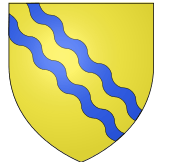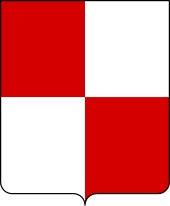Caetani
Caetani, or Gaetani, is the name of an Italian noble family which played a great part in the history of Pisa and of Rome, principally via their close links to the papacy.
Origins

The Caetani, or Gaetani family has Roman and Gothic origins. According to family tradition they were descendants of the Dukes of Gaeta, and traced their maternal ancestry to the Roman gens Anicia through the Counts of Tusculum. The founder of the house was Marinus I, Duke of Fondi, son of Docibilis II of Gaeta, from which the family gets its name. His successor was Constantine, who took the name Cagetanus and ruled in the latter half of the 10th century. In the late eleventh century, a descendant of his, Crescentius, was duke. This Crescentius was the father of two illustrious people: his successor, Marinus, and his son John (called Gaetanus or Coniulo) from Pisa, who was Pope Gelasius II. Marinus was succeeded by his son Crescentius, who defended his uncle the pope resolutely from imperialist attacks.
Nevertheless, the family had no more great importance in Rome until the election of Benedetto Caetani to the papacy as Pope Boniface VIII in 1294, when they at once became the most notable in the city. The pope conferred on them the fiefs of Sermoneta, Bassiano, Ninfa and San Donato (1297, 300), and the marquisate of Ancona in 1300, while Charles II of Anjou created the pope's brother count of Caserta.
Giordano Loffredo Caetani by his marriage with Giovanna dell'Aquila, heiress of the counts of Fondi and Traetto, in 1297 added the name of Aquila to his own, and his grandson Giacomo acquired the lordships of Piedimonte and Gioia. The Caetani proved brave warriors and formed a bodyguard to protect Boniface VIII from his many foes. During the 14th and 15th centuries their feuds with the Colonna caused frequent disturbances in Rome and the Campagna, sometimes amounting to civil war. They also played an important role as Neapolitan nobles: in particular, Onorato I Caetani was a powerful baron in what is now southern Lazio and one of the main supporters of Antipopes Clement VII and Benedict XIII. In 1500 Pope Alexander VI, in his attempt to crush the great Roman feudal nobility, confiscated the Caetani fiefs and gave them to his daughter Lucrezia Borgia; but they afterwards regained them.
Lines
Until this century, there were two lines of the Caetani family - Caetani and Gaetani Dell'Aquila d'Aragona. The Caetani family has since died out.
Caetani

Caetani, princes of Teano and dukes of Sermoneta, founded by Giacobello Caetani, whose grandson, Guglielmo Caetani, was granted the duchy of Sermoneta by Pope Pius III in 1503, the marquisate of Cisterna being conferred on the family by Sixtus V in 1585. In 1642, Francesco, the 7th Duke of Sermoneta, acquired by marriage the county of Caserta, which was exchanged for the principality of Teano in 1750. The 19th century head of the house, Onorato Caetani, 14th Duke of Sermoneta, 4th Prince of Teano, Duke of San Marco, Marquis of Cisterna, etc. (1842 – 1917), was a senator of the kingdom of Italy, and was minister for foreign affairs for a short time. His son Gelasio Caetani rose to fame during the First World War as a military mining engineer.
The last male member of the family was the noted composer, Don Roffredo Caetani, 17th Duke of Sermoneta and 8th Prince of Teano (1871–1961); his wife, Marguerite (Chapin), founded and edited the literary journal Botteghe Oscure. His niece Topazia (1921—90) married the composer Igor Markevitch and was the mother of the conductor Oleg Caetani, who uses his mother's surname without, however, being a member of the Italian noble family.
Gaetani Dell'Aquila d'Aragona
Gaetani dell'Aquila d'Aragona, Princes of Piedimonte, and Dukes of Laurenzana, founded by Onorato Gaetani dell'Aquila, Dount of Fondi, Traetto, Alife and Morcone, Lord of Piedimonte and Gioia, in 1454. The additional surname of Aragona was assumed after the marriage of Onorato Gaetani, Duke of Traetto (d. 1529), with Lucrezia of Aragon, natural daughter of King Ferdinand I of Naples. The duchy of Laurenzana, in the kingdom of Naples, was acquired by Alfonso Gaetani by his marriage in 1606 with Giulia di Ruggiero, Duchess of Laurenzana. The lordship of Piedimonte was raised to a principality in 1715.
The family is currently represented by Don Ferdinando Gaetani Dell'Aquilla D'Aragona, Prince of Piedimonte and Duke of Laurenzana (b. 1924), whose heir is Don Bonifacio Gaetani Dell'Aquilla D'Aragona (b. 1950).
References
- "CAETANI E GAETANI". Enciclopedia genealogica del Mediterraneo (in Italian). Italian Genealogical Society. Retrieved January 24, 2013.
Sources
- Original 1922 Almanach de Gotha (edited by Justice Perthes) entry for the Caetani family, link to the original universally-recognised genealogical reference document, with details of family honours